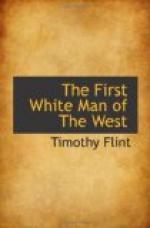The commanding general, though he had been for some time enfeebled with severe disease, acted with personal bravery, and delivered his orders with judgment and self-possession. A charge was made upon the savages with the bayonet: and they were driven from their covert with some loss, a distance of four hundred yards. But as soon as the charge was suspended, they returned to the attack. General Butler was mortally wounded; the left of the right wing broken, and the artillerists killed almost to a man. The guns were seized and the camp penetrated by the enemy. A desperate charge was headed by Colonel Butler, although he was severely wounded, and the Indians were again driven from the camp, and the artillery recovered. Several charges were repeated with partial success. The enemy only retreated, to return to the charge, flashed with new ardor. The ranks of the troops were broken, and the men pressed together in crowds, and were shot down without resistance. A retreat was all that remained, to save the remnant of the army. Colonel Darke was ordered to charge a body of savages that intercepted their retreat. Major Clark, with his battalion, was directed to cover the rear. These orders were carried into effect, and a most disorderly retreat commenced. A pursuit was kept up four miles, when, fortunately for the surviving Americans, the natural greediness of the savage appetite for plunder, called back the victorious Indians to the camp, to divide the spoils. The routed troops continued their flight to fort Jefferson, throwing away their arms on the road. The wounded were left here, and the army retired upon fort Washington.
In this fatal battle, fell thirty-eight commissioned officers, and five hundred and ninety-three non-commissioned officers and privates. Twenty-one commissioned officers, many of whom afterwards died of their wounds, and two hundred and forty-two non-commissioned officers and privates were wounded.
The savage force, in this fatal engagement, was led by a Mississago chief, who had been trained to war under the British, during the revolution. So superior was his knowledge of tactics, that the Indian chiefs, though extremely jealous of him, yielded the entire command to him; and he arranged and fought the battle with great combination of military skill. Their force amounted to four thousand; and they stated the Americans killed, at six hundred and twenty, and their own at sixty-five; but it was undoubtedly much greater. They took seven pieces of cannon and two hundred oxen, and many horses. The chief, at the close of the battle, bade the Indians forbear the pursuit of the Americans, as he said they had killed enough.
General Scott, with one thousand mounted volunteers from Kentucky, soon after marched against a party of the victors, at St. Clair’s fatal field. He found the Indians rioting in their plunder, riding the oxen in the glee of triumph, and acting as if the whole body was intoxicated. General Scott immediately attacked them. The contest was short but decisive. The Indians had two hundred killed on the spot. The cannon and military stores remaining, were retaken, and the savages completely routed. The loss of the Kentuckians was inconsiderable.




